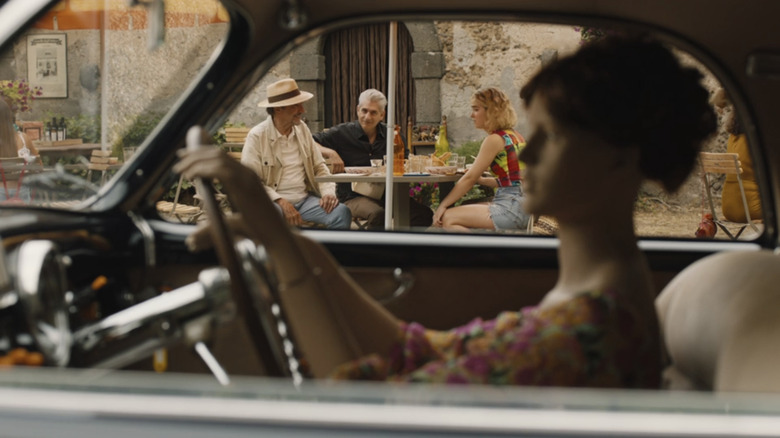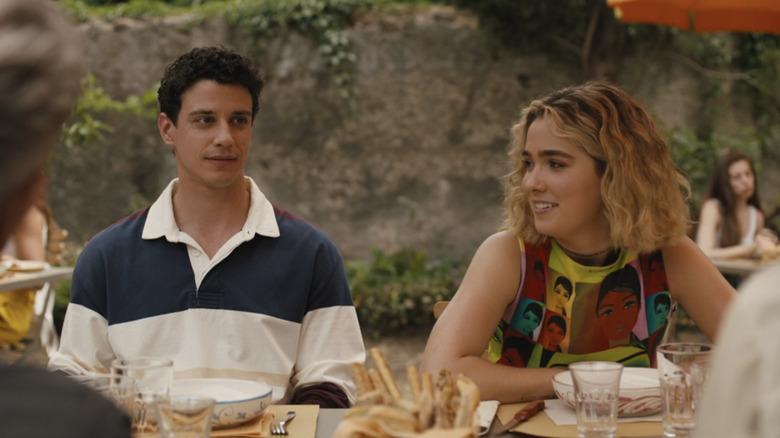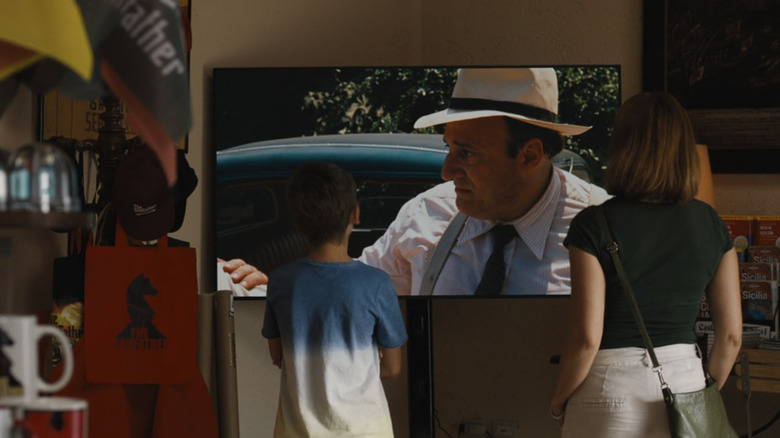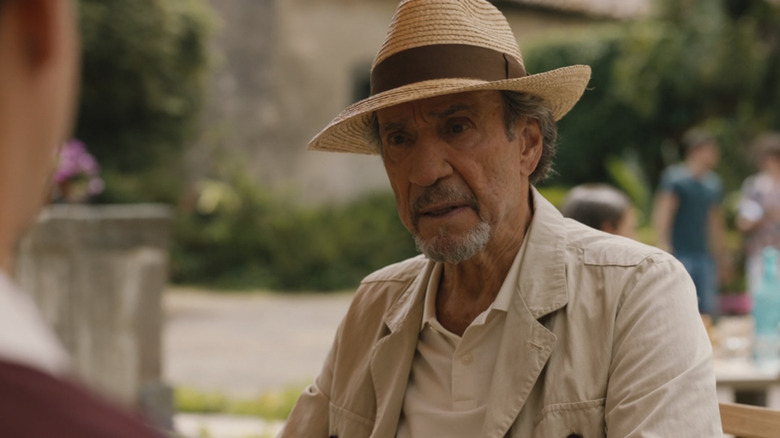The White Lotus Nails How We Struggle To Reassess Classic Cinema
Few cinematic cows are more sacred than Francis Ford Coppola's "The Godfather" trilogy. Largely considered one of the greatest films ever put to screen, the mob drama is a staple of American film and a mainstay in Italian-American culture. Becoming obsessed with "The Godfather" is a generational rite of passage, and despite the film's constant analysis ranging from the presence of oranges to the ridiculously true circumstances surrounding the film's production process, "The Godfather" continues to pop up as a reference point in other forms of entertainment.
As someone with a last name so Italian-sounding I'm a syllable shy of sharing the name of one of the "Teenage Mutant Ninja Turtles," it wasn't until my mid-20s that I was able to watch "The Godfather" in an objective way. In the "Italian Dream" episode of Mike White's "The White Lotus," new light was shed on a memorable quote from "The Godfather," where the show's plotline gave new meaning to the phrase, "In Sicily, women are more dangerous than shotguns." Now, in the episode "Bull Elephants," the three generations of rotting masculinity known as the Di Grasso family take a day trip to visit the Sicilian shooting locations of "The Godfather," enjoying lunch next to a dummy dressed like Apollonia Vitelli-Corleone in a car, a reference to the infamous scene where she is killed by a car bomb planted for her husband, Michael Corleone.
The family brings along Portia (Haley Lu Richardson), who has never actually seen "The Godfather," but doesn't find the idea of sitting next to a spot where a woman was blown to smithereens particularly exciting. This disconnect allows "The White Lotus" to spark a fascinating conversation surrounding the assessment of classic art from a different time, and how it reflects the way we also view people from a similar generation.
'Nostalgic for the solid days of the patriarchy'
Grandpa Bert Di Grasso (F. Murray Abraham) planned the trip to get in touch with the family's Sicilian roots, including worshipping at the altar of "The Godfather." He lights up with absolute glee when telling Portia why their lunch location is so important, reveling in how Al Pacino cries out "Apollonia!" as the Corleone character watches his wife explode before his eyes. "It's a great scene," Bert declares. Portia, having zero nostalgia or cultural kinship to the film pushes back. "She blows up? Like, blows up? It's a little tasteless maybe," she says.
Bert immediately tries to double down by saying, "Well, look, they're trying to make a buck. They own the house where they shot the best American movie ever made," but Portia finds a (possible incel) softboi ally in grandson Albie, who confidently disagrees with his grandpa about the film's brilliance, telling him he only likes it because "you're nostalgic for the solid days of the patriarchy." Look, I know Albie is trying his hardest to be the living embodiment of #NotAllMen, but his assessment of "The Godfather" is fundamentally inaccurate:
"Men love 'The Godfather' because they feel emasculated by modern society. It's a fantasy about a time when they could go out and solve all their problems with violence and sleep with every woman and then come home to their wife who doesn't ask them any questions and makes them pasta."
Albie, you moronic little bambino, that is not what "The Godfather" is about, but it is absolutely delightful watching him deliver this scene in front of his dad, Dominic, who is played by Michael Imperioli of "The Sopranos" fame, a series that only exists because of "The Godfather."
Is The Godfather a male power fantasy?
Bert and Dom Di Grasso then go on to say that "The Godfather" is a "normal male fantasy," which Albie disagrees with and instead says, "No, movies like that socialize men into having that fantasy." His father pushes back: "Movies like that exist because men already do have that fantasy. They're hard-wired," and Bert agrees. "Mm-hmm, comes with the testosterone." Albie can't let it go, and either because he genuinely believes what he's saying or because he's trying to impress Portia by coming off as "one of the good ones," he declares, "No. Gender is a construct. It's created."
The scene is magnificent because it's a circle of three generations of men being so loudly wrong about the message of "The Godfather," while simultaneously nailing why conversations surrounding classic films are never-ending and consistently complicated. All three of the Di Grasso men were introduced to "The Godfather" in different eras, and their relationships to masculinity are completely different because of not only the changing social climate, but the types of masculinity modeled for them by the men in their lives. Albie is the product of a lecherous grandfather and a philandering father, so it makes complete sense that he'd be constantly looking for reasons to explain away his own internalized feelings on toxic masculinity.
Or he's just a manipulative tryhard who has learned that leaning into the complicated aspects of masculine expression will get him laid less than parroting progressive talking points, like conservative men who write "I'm not political" on their Tinder profiles instead of admitting they drink the sweet fascist nectar of the MAGA regime.
Reminders of an offensive past
As is the case with all storylines on "The White Lotus," the discussion about "The Godfather" is not actually about "The Godfather." No, it's about the generational divide between Albie, Dom, and Bert. "You spent all that money on Stanford, and he comes back brainwashed," Bert says, "Do we embarrass you, Albie?" He replies, "No, it's just, I don't think you realize how you sound sometimes." Bert, as is usually the case, has the final word: "They used to respect the old. Now we're just reminders of an offensive past." He's clearly talking about himself, but he could very easily also be talking about "The Godfather."
Film is often a perfect time capsule of societal mindsets at the time of release, and as such, freezes a specific culture in celluloid. Albie's dislike of "The Godfather" is what happens when shallow, surface-level theorizing through a modern sense of morality is applied without taking into consideration the historical and cultural context of when the story was crafted (and what it was trying to capture). At the same time, Bert and Dom's blind-faith defense of the film is devoid of any nuance, and a reflection of two men who clearly intertwine their love of "The Godfather" with who they fundamentally are as people.
Assessing classic art from a different time period often sounds like people trying to make caveats for their elderly relatives, because it seems like in order to avoid upsetting the applecart of viewers (like Portia) who have no context for the film, we have to spend as much time adding asterisks or preemptive statements to lay the groundwork of a different era as we do actually assessing. This isn't necessarily a bad thing — we just, as a whole, tend to be really bad at it, and all end up sounding like three different very loud, very wrong assessments of "The Godfather" in the process.



